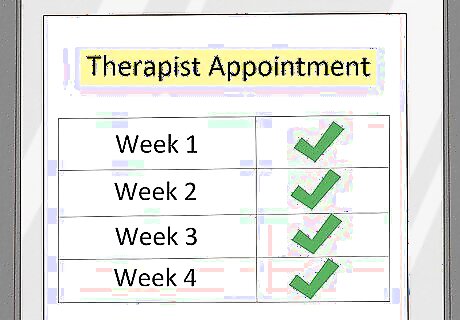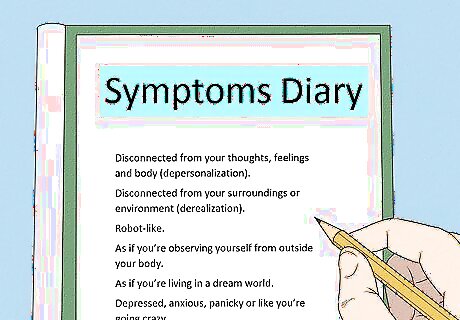
views
X
Trustworthy Source
Mayo Clinic
Educational website from one of the world's leading hospitals
Go to source
About 25% of people experience brief episodes of depersonalization at some point in their lives, but for others, it is a chronic, disturbing feeling. If you are suffering from chronic depersonalization that is interfering with your work, daily activities, or relationships, or if you feel emotionally unstable, contact a doctor immediately.[2]
X
Trustworthy Source
Mayo Clinic
Educational website from one of the world's leading hospitals
Go to source
Grounding Yourself in Reality

Acknowledge and accept the feeling of depersonalization. The feeling of depersonalization is usually not dangerous and commonly fades. Remind yourself that the feeling is uncomfortable, but temporary. This will make depersonalization have less control over you. Tell yourself, “This feeling will go away.” Tell yourself, “I feel weird right now, but I am OK.” Think about any other instances in which you experienced depersonalization, and remember that the feeling went away then, too.

Focus on your immediate surroundings. Notice what the temperature is, what things are around you, and what sounds you are hearing. Engage with a nearby object, such as turning on a fan or writing with a pen. This will force your mind to be in the present moment, and will lessen the feeling of depersonalization. You can also carry around a tactile item, such as sandpaper or something furry, to touch during intense depersonalization moments. Mentally list things you see, hear, and feel around you. If possible, listen to music. Aim for favorite tunes that give you positive feelings, rather than any music that may increase anxiety or sadness. Research shows that music therapy is effective for all sorts of mental illnesses and can significantly reduce anxiety, depression, or agitation, all of which may be present in chronic cases of depersonalization.

Engage with those around you. Begin a conversation, or get back into the conversation you were having. This will bring you into the present moment. If you are alone, text or call a friend or family member just to chat. You do not have to reveal your depersonalization to others. At the same time, many people are aware of and have experienced depersonalization; if you feel comfortable, talk about your feelings with a friend as they are happening.
Relieving Depersonalization Due to Anxiety

Practice diaphragmatic breathing. When you feel anxious, your body goes into "fight or flight" mode. Deep, diaphragmatic breathing can interrupt that reaction and help you to relax. To practice diaphragmatic breathing, lie on your back on your bed. Leave your knees bent by placing a pillow beneath them for support. Place one hand on your chest and one below your rib cage to monitor the movement of your diaphragm. Take a slow, deep breath in through your nose. Notice your stomach pushing your lower hand out (the upper hand should remain still). Tighten your stomach muscles, and exhale the breath through pursed lips making sure that your chest is not moving. Repeat. If you are in a group situation, excuse yourself to the bathroom or another private area to practice deep breathing. You can breathe in this rhythmic way for 5 to 10 minutes about 3 or 4 times per day when you notice yourself feeling anxious or disconnected.

Combat negative thoughts. Having feelings of depersonalization can cause you to think you are crazy, to feel as if you are not in control, or might even make you feel like you will faint or stop breathing. Combat any negative thoughts with positive statements, such as: I’m going to be ok. I will relax. Feeling like I’m not real isn’t dangerous; I’ll be fine. I don’t like these feelings, but they will go away. I am present in this moment.

Make time to engage in positive activities. Your hobbies may include playing the guitar, scrapbooking, or collecting antiques. Whatever it is that relieves your stress, try to do it often, particularly when you find yourself experiencing more anxiety or depersonalization. This will prevent moments of severe anxiety and will help lessen the instances where you feel depersonalization. Practice stress management daily whether that means taking time out for quiet or pulling aside a few minutes everyday to take part in an activity you enjoy.

Exercise regularly. Because depersonalization is commonly associated with anxiety and depression, exercise is a great way to relieve feelings of being “un-real.” Exercise boosts your confidence, releases tension, and helps manage stress levels. Engage in daily walks, begin a jogging regimen, or find another type of physical activity that relieves your stress. Scientists have found that a neuropeptide called galanin, which is released during and after exercise, protects the synapses in the prefrontal cortex and helps our brains with emotion regulation and stress resilience.

Get adequate sleep. Maintaining a regular sleep regimen of about 8 to 9 hours per night is significant for relieving anxiety and overcoming the resulting depersonalization that can occur from it. The link between sleep and anxiety/stress is a two-way street, in which not managing one causes a problem in the other. Practice good sleep hygiene to ensure that you get the amount of sleep required to fend off feelings of depersonalization. Avoid caffeine and alcohol, as they both can trigger anxiety and keep you up at night. Establish a winding down routine nightly that includes relaxing activities such as reading, listening to soothing music, or meditating. Reserve the bedroom for sleep and relaxation only. And, shut down all electronics at least one hour before bed.
Getting Professional Help

Find a therapist. If your feelings of depersonalization are interfering with your daily life, you need to consult a medical professional. There are many types of therapy for treating depersonalization disorder. When finding a therapist, ask what type of counseling they provide and which type of counseling is right for you. Common forms of treatment for depersonalization include: Cognitive therapy- works on changing your thoughts about feeling unreal Behavioral therapy- helps you to develop behavioral strategies to distract yourself from depersonalization symptoms Psychodynamic therapy- aims to resolve painful feelings and experiences that stimulate a need to detach from yourself and reality Grounding techniques- similar to those listed above, these tactics use the five senses to help you feel more connected to yourself and the world around you If you find a certain therapist to be unhelpful, you can always go to a different one.

Attend therapy as often as necessary. This will vary according to the severity of your depersonalization. Some people attend therapy monthly, weekly, and, in severe cases, daily. Your doctor will determine how often you should go to therapy. Skipping out on therapy sessions will prevent you from getting the help you need; attend all scheduled appointments. If you do not have a scheduled appointment and feel like you need immediate help, call 911. If you are suicidal, contact a suicide prevention hotline such as the 988 Suicide and Crisis Lifeline if you're in the United States, which can be reached by calling or texting 988.

Keep a diary of your symptoms. This will greatly aid you in communicating about your depersonalization. Write down where and when you have any attacks, and record as much detail about the attack as possible, including your thoughts at the time. If you feel comfortable, show these records to your therapist, or bring them to therapy sessions as a reference. Be sure to take note if the symptoms of your depersonalization overlap with that of another illness. Depersonalization often accompanies serious mental illness such as schizophrenia, depression, and post-traumatic stress disorder. Tell your doctor if you are avoiding friends, family, work or activities that you once enjoyed because of your symptoms, as this could indicate a larger problem or a co-morbid disorder.

Take medication if necessary. Though there is no medication specifically prescribed for dissociative disorders, anti-anxiety medication or antidepressants are commonly prescribed, with varying degrees of success. Your doctor may prescribe fluoxetine, clomipramine, or clonazepam. Just remember, if you do begin to take medication, never stop taking it without consulting your doctor first. Avoid drugs and alcohol when taking any anti-anxiety or anti-depressant medication. Never take more medication than your doctor prescribed.

















Comments
0 comment